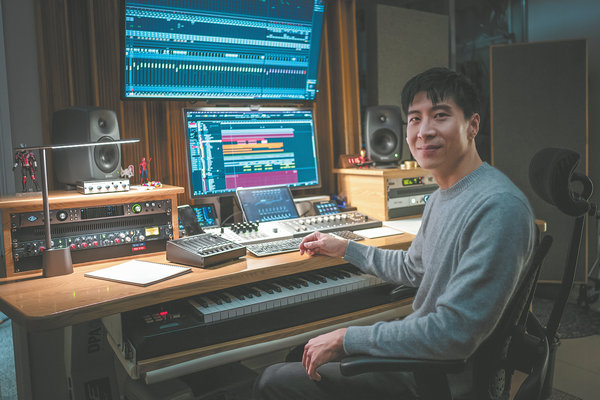Striking a chord
Singaporean composer straddling home and Beijing hits the right notes with Chinese listeners, Alexis Hooi reports.
By Alexis Hooi | China Daily | Updated: 2024-01-08 11:03
Three years ago, composer Benjamin Lim Yi was asked to help with an epic drama series marking the centennial of the Communist Party of China.
Lim scored the soundtrack for two episodes of 40-part series Faith Makes Great, winning accolades among audiences with his soundtrack. That included writing a "red song", a genre commonly used to commemorate the people's liberation and road to nation-building led by the Party.
The achievement seems even more impressive because Lim is Singaporean, making him the only foreigner on the music team for the project.
"The interesting thing about the TV series is every episode is a singular, self-contained short film on its own. So they have these stories about the unsung hero and I approached it from telling the story. A lot of people apparently really felt it in the music," says Lim, 39.
"One of the episodes required a closing song, and I'm very sensitive to the lyrics and there's something that's very moving about them, so I tried to reflect that," he says.
"Some composers can be very formulaic, but I approached it as a chance to break away from the formula and live for the production. If you lead with heart, you can still move people," says Lim of the tight restrictions on the style within the red-song genre.
The Beijing-based composer has since worked on more than 40 red songs covering major productions and performances, adding significantly to a rich repertoire that ranges from commissioned concert pieces, theater, contemporary dance and stage productions, to film, television and children's music.

They have been performed and presented in Singapore, Taiwan, Hong Kong, Tokyo, Seoul, London and many cities across the Chinese mainland, including Shanghai and Beijing.
Lim's multiple awards received at home and abroad show how he successfully straddles between Singapore and China, his works resonating with audiences through a cultural affinity that complements his education, experience and expertise.
"Writing music to me is a very personal journey. There's a part of me in every work I write. It's deeply personal yet at the same time serving what it needs to do, to tell the story," he says.
"Maybe that's why people feel the authenticity, as if you are watching or understanding this story with a real person beside you on the couch."
Lim says he actually had a late start in music, learning to play the sheng, an ancient Chinese wind instrument, when he was 15.
Even as he taught music to Singaporean students early in his career, Lim would spend his summer and winter breaks in Beijing perfecting his musical technique and skills.
"I self-funded myself, twice a year, up to four months every year for three years, coming to Beijing to study the sheng and later composition," he says.
In 2013, Lim was the first foreigner to be accepted in a cohort of 20 students at China's top music college, the Central Conservatory of Music, in its capital. With Chinese and Singaporean scholarships, he went on to complete a master's degree in music composition at the elite institution and is still the sole Singaporean to have done so.
"I like the sheng and I like performing, but I'm not a natural-born performer," he says. "I'm very introverted actually. I know that composition is my thing."
Over the past decade, Lim has earned a reputation for his reliability and efficiency, taking on projects which many others in the field are unable to deliver, especially on tight deadlines. Much of his work comes via recommendations and referrals.
"They know that when they have problems in post-production, I'm here to fix them, I'm their man. Or it's a different production and they call me up for advice. This happens every day, I'm always helping to troubleshoot for people, sharing our industry experience," says Lim, who heads a team of four at his post-production music studio, BLY Studios, in Beijing.
"The people we work with, they all become friends. We're so tightly-knit, we're so involved and there's so much heart that we pour into it, our collaborators appreciate that.
"As a boutique studio, the way we'd like to brand ourselves is also that you come to us because you want bespoke, tailor-made quality," he says.
"Classic films are classic films because they work as a whole package. Sure, you can have great actors and a good script, but all departments have to pull their 'A' game; the lighting, the wardrobe, the set design, everyone has to bring their 'A' game to the story. That's what our studio does and that's what we're very proud of."

Lim's soundtracks for the big screen alone have accompanied and won various awards at numerous international film festivals, including those in Busan, Berlin, Shanghai, Osaka, Jakarta and Singapore.
While the trophies and tributes are nice to have, he says the direct response and recognition from his listeners themselves are still what counts for staying power in an industry that works behind the scenes.
"What I bring to the production …it shows, because the audience will react. It has to resonate with them," Lim says.
His extensive involvement in Chinese film also covers indie and student projects, which he says are necessary to support and nurture talent.
"These are indie, short films that we're very proud of. A lot of them have won awards (with) young, emerging directors. A lot of the works were done when they were final-year students," Lim says.
He says his team sets aside a portion of its yearly schedule to seek out interesting stories during the casting for actors. With the students' budget, the team does the entire post-production sound and music for them.
"It's a lot of work, double the effort, but we should thank them as well," he says. "We get this fresh breath of perspective with these young filmmakers and more importantly, what stories the young artists today are interested in and telling. To me that keeps me alive and current, it keeps me relevant."
Lim says that for some of these films, sometimes it does feel that they helped a small, lesser-known film punch way above its weight.
"That's why it's very meaningful in that way, very underdog," Lim says. "In a way, I've also been viewed as an underdog. Underdogs resonate with us. We also punch way above our weight. A lot of people who come to us, we may not have been their first choice but they stayed with us."
Lim continues to write music and lesson plans for Singaporean syllabuses and collaborates with educational authorities, giving lectures and talks on music or pedagogy and teacher training.
He is also an external examiner for students in the Chinese cities of Tianjin, Guangzhou in Guangdong province, and Wuhan in Hubei province.
His wife Sun Ying is a top recording artist specializing in the pipa, a traditional Chinese lute. They have a 3-year-old son.
"For a lot of my Chinese friends here, I'm probably the only Singaporean they know and will ever know in their lives," he says, "so it's added pressure to try to live up to expectations."
Lim recalls a local media interview when he was asked "a very difficult question", about how his music would be different if he and a Chinese counterpart were to be commissioned for the same project.
"We are all a product of our own unique experiences, and that will always be reflected in your art," he says.
"I may have taken a more meandering route to get to where I am, but I like to think of it as stopping to smell more flowers and it's made me more vibrant in my own kaleidoscopic way … I'm still a work in progress."
























